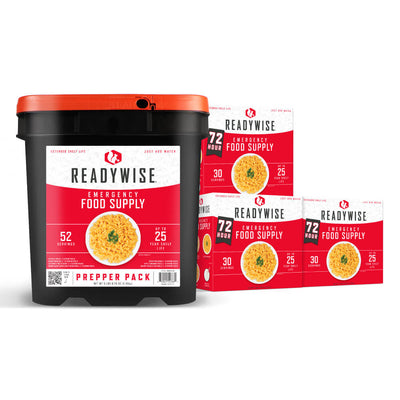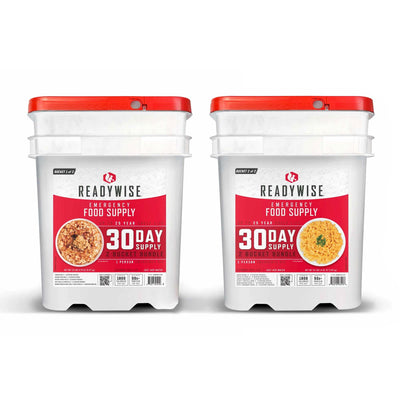Common Emergency Prepping Mistakes
You’ve realized it’s time to prepare for emergencies and disasters. That’s great! You’re taking steps to ensure the safety and survival of yourself and your family in what are often unstable times and in the face of increasingly severe weather and natural disasters.
Like any new skill, there’s a learning curve involved with prepping, and a set of common mistakes people make as they learn how to protect themselves. Knowing what mistakes to avoid will help you gain the skills and supplies you need faster and more effectively. Here are some of the more common mistakes, brought to you by more experienced preppers so you won’t repeat their growing pains.
Buying Before Researching
Once you realize you need to prepare for emergencies, it’s tempting rush into stockpiling supplies. This is a very effective way to max out your credit card and buy equipment and supplies that don’t fit your needs.
Do your research first. Read up on disaster prepping and gather the information you need to make informed decisions. Don’t rely on a sole source of information either—just like any other community, the prepping community has people who spread inaccurate information. Read all you can, and then start buying what you know you’ll need, not what you think you’ll need.
Choosing Supplies Over Training
Supplies alone won’t keep you safe. Would you be able to fend for yourself if your food supply burned to the ground? If you had to provide emergency medical assistance, would you be able to use the items in your first aid kit effectively?
Supplies are nothing without skills, especially in a disaster situation. If you buy a medical kit, take first aid classes. If you own a rifle, learn to hunt. Learning new skills is one of the most enjoyable parts of disaster prepping, and knowing you can handle yourself in an emergency is a real confidence booster.
Not Keeping a Survival Library
While there are fantastic online prepping resources, all of them need an internet connection and a power source. In an emergency, especially a long-term disaster, you might not have access to either. Books, however, are much more reliable.
Discounting What You Already Own
One of the best pieces of advice a prepper ever gave one of our staff was simple and elegant: don’t reinvent the wheel. Chances are you already have items and supplies you could use in an emergency. They may not be sufficient for a full-scale emergency, but that doesn’t make them useless. Do you need a $500 sleeping bag if you’ve got thick camping blankets? How long could you sustain yourself from the food in your pantry? Do you own outdoor equipment you could use in a disaster? Chances are, some of the things you need to survive are already in your home.
Limiting Food Choices
There are disaster preppers out there sitting on stockpiles of food consisting solely of rice, beans, wheat, sugar, salt, and nothing else. That’s a horribly unimaginative diet, even if you only have to live off your stores for a week.
With today’s advances in dehydration and freeze-drying, there’s no reason to limit your food choices. An emergency is tough enough without having to steel yourself for another meal of unseasoned beans. Buy a varied selection of emergency food, and learn to cook it. Keep an inventory of what you have and rotate items with limited shelf lives by cooking them as part of your regular meal preparations.
Don’t limit your emergency supplies to just food and water. A small supply of personal hygiene products, pet supplies, cooking equipment, and extra clothing will make waiting out a disaster easier and more comfortable.
Assembling an Arsenal is Not Prepping
Hollywood has, predictably, a one-dimensional view of disaster preppers. They’re the characters living in a cabin in the woods filled with guns and ammo. Sadly, some people really do prep this way---amassing a large amount of firepower with little in the way of food or water. This is not prepping. Firearms and ammo have their place in a disaster plan: you might have to defend yourself. But all firepower and no food is the strategy of someone who doesn’t know what it takes to survive a disaster.
Loose Lips
Even if you’re excited about prepping, keep it to yourself. There’s no reason people outside of the family need to know about your supplies. In the event of a serious disaster, you only want trusted friends and family in the loop. That guy with all the guns and ammo? You definitely don’t want him knowing about your water and food resources when he gets hungry.
Underestimating Water Needs
This is, perhaps, the single greatest mistake a novice prepper can make. A previously well-fed adult can last for weeks without food. It wouldn’t be pleasant, but it’s possible. Without water, most of us would be dead within days. Store as much water as you can—standard advice is a gallon per person per day, stored in heavy-duty, stackable containers. Understanding how to gather and purify water will prove invaluable if you’re forced to ride out a long-term cessation of public services.
Resources
http://preparednessadvice.com/self-sufficiency/12-common-prepping-mistakes-made-beginners/
http://urbansurvivalsite.com/10-common-prepping-mistakes/
















































































